Jan 2007
Jan 2007 sadminAGRICULTURE LAND REFORM - THE FUTURE LOOKS BRIGHT
AGRICULTURE LAND REFORM - THE FUTURE LOOKS BRIGHT sadmin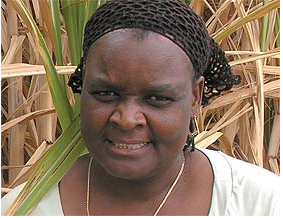 Nelly Ngomane should have been proud of her job as a school teacher in a rural area.
Nelly Ngomane should have been proud of her job as a school teacher in a rural area.
But Ngomane, of Emangweni Village in Mpumalanga, found the classroom boring. Dressing formally every day and writing on the chalk board was not for her. She dreamed of working in the fields wearing boots and overalls.
Sugar Cane
In 1995 Ngomane, the mother of a teenage boy and girl, left teaching. She started planting sugar cane at home and sold it to a local sugar cane mill. But she made little profit because her yard was too small.
Today, thanks to the Land Redistribution for Agricultural Development (LRAD) pro-gramme, Ngomane’s dream of becoming a successful farmer has come true. She is now the proud owner of a 41,2 hectare farm worth R2,4 million.
Chance to buy farms
The LRAD is a programme of the Department of Agriculture and Land Affairs. Government uses this programme to help previously disadvantaged people who want to become farmers, but do not own land.
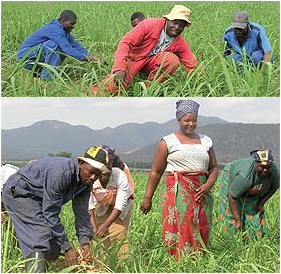
LRAD gives such people the chance to buy farms from white owners. It also provides them with money to start farming.
In Ehlanzeni District Munici-pality in Mpumalanga, the LRAD bought about 260 hectares of sugar cane farms in different local municipalities.
Advice
The farms cost about R16 million. Seven people including Ngomane were chosen from the many who applied for the opportunity.
The farmers sell their sugar cane to TSB Sugar, a local sugar mill. People with good knowledge about farming, including the previous farm owners, help the new farmers with advice.
Things were tough
Vuk’uzenzele visited some of the sugar cane farms in Mpumalanga. Elliot Ngomane (not Nelly’s relative), who benefited from the programme, told us that things were tough at first.
He and three of his family members identified a farm to buy. They received a loan of R1,2 million from the LRAD to buy a 53,5 hectare farm. Because the farm was worth R2,7 million, the Ngomanes borrowed an extra R2 million from the bank.
The bank wanted them to give money every month to repay the loan, but they hadn’t made any profit yet.
"Farmers only make money after the harvest, not every month," Ngomane said. "But in the past few months we have started making some profit and we are no longer behind with our payments. The future looks bright."
Be wise about loans
Mpumalanga MEC for Agriculture and Land Administration, Madala Masuku, warned farmers to be wise about taking loans from banks.
"Farmers should not borrow more than they are able to repay," Masuku said.
"We are trying to arrange with the banks for repayment methods that suit farmers better, so that they can start making profit immediately."
- Ndivhuwo Khangale
Did you know?
Government wants 30 per cent of land to belong to previously disadvantaged people by 2014.
Before 31 December 1998, government received 79 696 land claims from all over the country. Of these, 71 645 have been settled.
How to get a LRAD grant
- You must identify the land you want to buy. Then ask the Department of Land Affairs for a loan, called a LRAD grant.
- To get a LRAD grant of R20 000, you must have about R5 000 capital available.
- This capital does not have to be money; it can be in the form of farming equipment or cattle. Once you have received your first grant, you can apply for more money.
- Before getting a grant, you must undergo training to get proper farming skills.
- The department will also give any legal help you will need for buying the farm.
CARTOON STRIP SKILLS DEVELOPMENT
CARTOON STRIP SKILLS DEVELOPMENT sadmin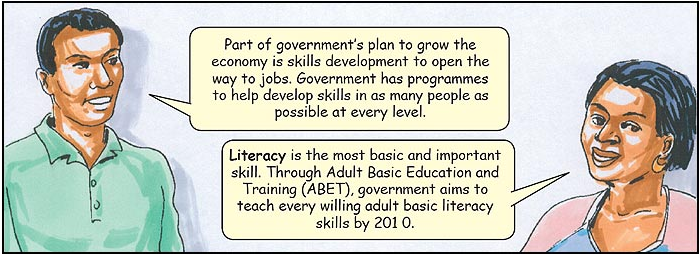
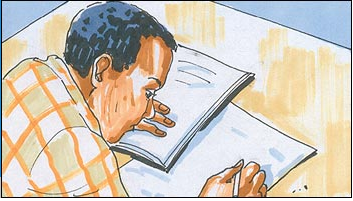 ABET
ABET
Government is making it easier for people to get literacy and number skills through its Adult Learning Centres. Business and labour are working with government, through SETAs, to ensure that by 2010 every adult South African can read and write.
Contact: 1020 or (012) 312-5368
LEARNERSHIPS
Government and business are working together to give learnerships to unemployed young people. Through learnerships, training is given in the workplace. Learners get both book 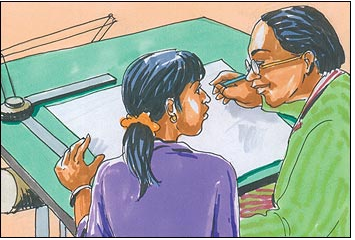 knowledge and on-the-job training. The aim is that once a young person completes the Learnership Programme, he or she will have the necessary skills to get a permanent job or to study further.
knowledge and on-the-job training. The aim is that once a young person completes the Learnership Programme, he or she will have the necessary skills to get a permanent job or to study further.
Contact: (012) 309-5043 or 10208
For information on any of the programmes mentioned, call 1020 at any time.
Calls are free from Telkom lines.

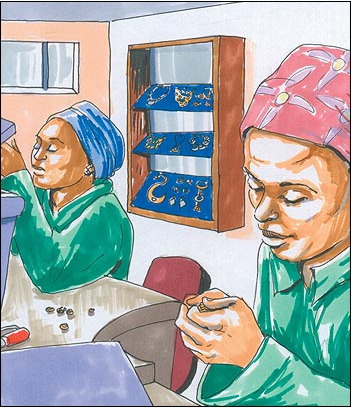 KGABANE PROGRAMME
KGABANE PROGRAMME
Many unemployed people in rural areas have the skills to make crafts, but they don’t have opportunities to develop their skills. The Kgabane programme of the Department of Minerals and Energy develops craftspeople by training them to make jewellery with precious metals like gold and silver. The Programme gives two types of training, through the Mining Qualifications Authority (MQA):
a skills programme in rural jewellery;
a level 2 and 3 jewellery learnership.
Both courses also teach business skills. Trainees who complete the course, get certificates from the MQA. They also get the necessary equipment to help them start their own jewellery businesses. In addition, ongoing help with design and quality is given, as well as finishing off of the jewellery products at the Mintek workshop.
Contact: 1020 or (011) 630-3550
TSHUMISANO PROGRAMME
The Tshumisano programme of the Department of Science and Technology gives technical and financial support to ‘technology stations’ at universities of technology. In return, these stations give technology solutions, services and training to existing small businesses.
Contact: 1020 or (012) 844-0413
This panel first appeared in Building a People’s Contract for Faster and Shared Growth,
a booklet published by Government.
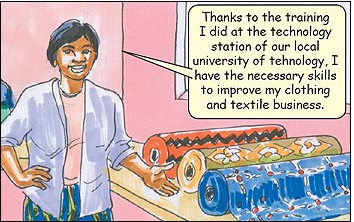
CHILD PROTECTION OPERATION ISONDLO - BOTH PARENTS MUST PLAY ROLE
CHILD PROTECTION OPERATION ISONDLO - BOTH PARENTS MUST PLAY ROLE sadmin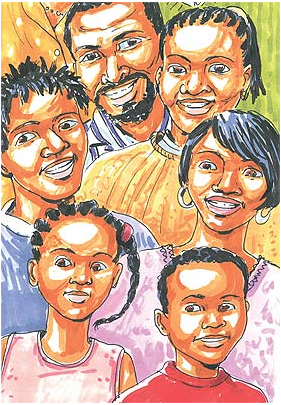 All children have the right to food, shelter and basic health care says our Bill of Rights.
All children have the right to food, shelter and basic health care says our Bill of Rights.
Children are a special group in our society.
They cannot take care of themselves and deserve the love and support of both parents. This is why parents or guardians must give them what they need until they are old enough to look after themselves.
Responsibilities
Thanks to Operation Isondlo, many children in South Africa are now getting the support they deserve. ‘Isondlo’ is a Zulu word meaning ‘support’ or ‘maintenance’.
Operation Isondlo is a government plan to strengthen the maintenance system in South Africa. It was started last year by the Department of Justice. The plan encourages parents to support their children even though they are divorced or separated. It also educates parents about their rights and responsibilities.
Benefits taken away
Minister of Justice Brigitte Mabandla said Operation Isondlo helped the de-partment to get money from parents who did not pay and to give the money to the beneficiaries. Thanks to this plan many children have received maintenance money in the past months.
The Maintenance Law makes it possible for benefits like pension and investments to be taken away from parents who fail to pay even if the benefits come from their employers, she said. This money is then used for unpaid maintenance.
Parents could also be jailed for up to 12 months if they failed to support their children, she said.
It is not always the father who has to pay maintenance. An man raising his child can also claim maintenance from the mother of the child if the mother has a job.
Parents who adopted a child while living together also have the right to claim maintenance from each other after they separate.
Reducing poverty
Paying maintenance is another way of reducing violence against women and children, Mabandla said. It also helps to fight poverty and contributes towards children’s education.
Through Operation Isondlo we can reduce the number of people who solely depend on child support grants for survival.
- Justice Mohale
Parents have to:
- pay maintenance for their children and support them even if the parents are divorced or separated;
- ensure that their children have food, clothes and a safe place to live;
- pay for their children’s education and medicine.
Parents can go to their magistrate’s court to claim maintenance. They can also contact the Department of Justice and Constitutional Development: (012) 315-1729, (012) 315-1723 or call 1020.
COMMUNITY SURVEY 2007 HELP GOVERNMENT PLAN BETTER
COMMUNITY SURVEY 2007 HELP GOVERNMENT PLAN BETTER sadmin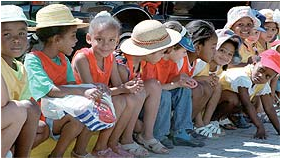 From 7 February this year, Statistics South Africa will collect information about people in different communities all over the country. This will be done through a com-munity survey.
From 7 February this year, Statistics South Africa will collect information about people in different communities all over the country. This will be done through a com-munity survey.
A community survey is when information is collected like the number of people in a community, their ages, how many are women, men or children, the languages they speak, the income per household and the level of education.
Why is iy necessary?
The information will help government to plan better for the future. It will also show how much communities have developed and grown and whether some of government’s goals have been reached.
The community survey will not involve all the people in South Africa, but only about 300 000 households.
A survey of all the people in the country is called a population census. Through a population census government finds out how many people live in the country, how fast the population is growing, what the average income of the people are, how old they are and so on.
Close the gap
In this survey, the 300 000 will be representative of the whole country. For example, half of them will be women; a quarter will be less than 19 years old.
In the past, a population census was held every five years, but now it only happens every 10 years. The community survey is held to close the gap between the last census, which was held in 2001, and the next one, which will be held in 2011.
Interviews
All the people whose households are in the enumerated areas, will be interviewed during the survey.
An 'enumeration area' is a term used in statistics meaning the smallest unit or piece of land into which the country is divided for the purpose of counting.
Officials of Statistics SA will collect information through person-to-person interviews using a questionnaire. All the information will be kept confidential.
How to recognise officials
You will recognise Statistics SA offcials by:
- yellow over-shirts;
- yellow shoulder bags;
- blue caps showing the words 'Community Survey 2007';
- stickers on cars showing the words 'Stats SA/Community Survey',
- Stats SA identity cards.
Explanation of terms
- Statistics: collecting facts, like those about people, weather, or business conditions and showing them as numbers that can be compared with other similar facts.
- Enumeration: the process of counting members of a population to collect infor-mation about them.
For more information, call 1020
DEALING WITH DISABILITY YOUR BLIND CHILD CAN LEAD A NORMAL LIFE
DEALING WITH DISABILITY YOUR BLIND CHILD CAN LEAD A NORMAL LIFE sadmin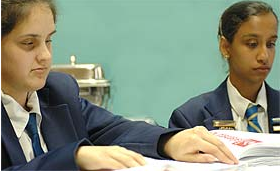 We are all equal before the law. Whether we are blind or can see, the law gives us equal protection.
We are all equal before the law. Whether we are blind or can see, the law gives us equal protection.
Our Constitution says that the state may not discriminate against anyone because of a disability. We should therefore treat blind people with the same respect as everybody else.
Blind SA
"Parents, if your baby is born blind, do not lose hope. If your child becomes blind later in life, do not despair," says Cathy Donaldson, President of Blind SA.
"Instead, help your blind child to get a good education and to do things for him or herself. With your help your child can learn to live a normal and productive life."
Blind SA, an organisation that helps blind people, says:
- Parents should not feel ashamed of a blind child.
- Parents should get to know blind adults to see how such people live normal and meaningful lives.
- Communities should support parents with blind children.
- Doctors, social workers and health workers should refer people to Blind SA for support.
Develop their senses
Blind children get to know the world through their senses like touching, smelling, tasting, and hearing. Parents or caretakers can help them to develop these senses.
Remember, they cannot see when you point at or talk about things. Let them feel and play with different objects that are rough, smooth, soft, hard, small or big.
Introduce them to new smells, tastes and sounds. Get toys that can make a noise. Put the toy in the child’s hand and encourage the child to play with it. If the child drops it, search for it by using hands.
Knowledge
Talk and read to blind children often. Make sure they understand and let them talk back. This helps them to learn the language while increasing their knowledge.
Teach them to do things for themselves like tying their shoes, dressing themselves, brushing their teeth and putting things back in their places. Take them for walks. Go to places like shops, museums, farms, parks and the zoo. Explain what each new place looks like.
Teach your blind child about dangerous things like fire, electricity and sharp objects.
Education
To help your blind child get a good education, you can:
- enrol your child at good schools, including pre-school, that can meet the child’s special needs;
- make sure the teachers have the skills to teach blind children;
- find out if Braille is taught;
- talk to the teachers and head of the school about your child’s blindness and about ways that you can work together;
- find out about study and training bursaries from Blind SA.
- Justice Mohale
For more information, contact: Cathy Donaldson at Blind SA:
(011) 753-1607/083 701 4246
E-mail: mwcathdo@mweb.co.za
FINDING EMPLOYMENT GETTING INTO THE JOB MARKET
FINDING EMPLOYMENT GETTING INTO THE JOB MARKET sadmin 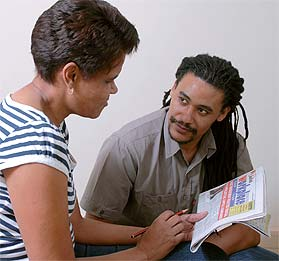 Are you one of the many young people who passed your matric or finished your studies at the end of last year? Then you will be among those looking for jobs this year. But where and how can you start?
Are you one of the many young people who passed your matric or finished your studies at the end of last year? Then you will be among those looking for jobs this year. But where and how can you start?
Job Seekers Database
Government, through the Umsobomvu Youth Fund, has started a free database (collection of information stored in a computer) called JOBS on the Internet.
JOBS is the nickname for 'Jobs and Opportunity Seekers Database'. It helps young people to find jobs by placing their information on the database. Employers who are looking for people to work for them can then go to the database to find the right person for a particular job.
To put your information in the form of a curriculum vitae (CV) on the JOBS database, go to www.youthportal.org.za on the Internet.
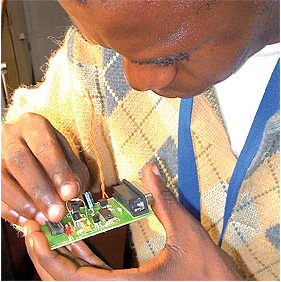 Useful Information
Useful Information
The Umsobomvu Youth Fund will also help with useful in-formation like learnerships, skills development and business and job opportunities that are available to young graduates.
You can visit any of the Umsobomvu Youth Fund’s Advisory Centres for more in-formation. See contact details opposite page.
Department of Labour
The Department of Labour can also help you find a job. You can register your name and work details on the department‘s work seekers database.
To register, applicants must fill in a Work-Seekers Registration Form. These are available from your nearest Labour Centre or Provincial Office of the Department of Labour.
Your own business
If you have always dreamed of starting your own business, you don't have to join the long line of job seekers. You can realise your dream of becoming an entrepreneur through government’s Small 7Enterprise Development Agency (Seda).
Seda will help you with information like how to start and run your own business and how to get the right business training. They work with organisations that support small businesses throughout the country.
Seda has Enterprise Information Centres and branches in the main centres of all the provinces.
Learnerships
Have you ever wanted to study at a university or college, but don’t have money? Government wants all young people to have opportunities for further study and has a plan to help you with money.
For the past five years, Sector Education and Training Authori-ties (SETAs) have provided training and money to develop skills through learnerships.
Learnerships are part of government’s plan to develop skills. A learnership means that you work for a company, while getting specialised on-the-job training and study at the same time. The relevant SETA will pay the costs of the training. Competition for learnerships is tough and applicants must do a selection test before being accepted.
- Justice Mohale and Ndivhuwo Khangale
Unemployment has dropped by one percent in the past year. Many people are finding jobs, but many are still looking for jobs.
Helping young people to get training in the form of learnerships, is part of government’s plan to grow the economy and reduce poverty
Umsobomvu Youth Fund: For your nearest Umsobomvu Youth Advisory Centre, or more information on the JOBS database: (011) 651-7000. For more information on job opportunities, go to the Umsobomvu Youth Fund website: www.youthportal.org.za
•For your nearest Seda Enterprise Information Centre or branch office: 0860 103 703
•For your nearest Labour Centre or Provincial Office of the Department of Labour: (012) 309-4000 or go to www.labour.gov.za
For more information, call Batho Pele Gateway Call Centre: 1020
For more information on learnerships in your particular field of interest,
contact one of the following SETAs:
Construction SETA: (011) 265-5900
Services SETA: (011) 276-9707
Bank SETA: (011) 805-9661
Transport, Education and Training Authority: (011) 781-1280
Media, Advertising, Packaging and Printing: (021) 910-3001, (011) 234-2311
Mining Qualifications Authority: (011) 630-3500
Safety and Security: (011) 347-0200
Primary Agriculture Education and Training Authority: (012) 325-1655
Manufacturing, Engineering and Related Services: (011) 484- 9310
Council on Higher Education: (012) 392-9100 / 9126
Chemical Industry Education Training Authority: (011) 726-4026
Clothing, Textile, Footwear and Leather SETA: (031) 702-4482 / (011) 402-0711
Energy SETA: (011) 689-5300
Education, Training and Development Practice: (011) 628-5000
Financial and Accounting Service: 086 101 0001
Forest Industries Education Training Authority: (011) 712-0600/01
Food and Beverages Manufacturing Industry: (011) 253-7300
Health and Welfare SETA: (011) 607-6900
Insurance SETA: (011) 544-2000
Local Government and Related Services: (011) 456-8579.
FINDING EMPLOYMENT HOW TO WRITE A WINNING CV
FINDING EMPLOYMENT HOW TO WRITE A WINNING CV sadmin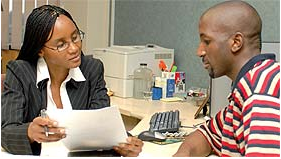 Those who know, will tell you that looking for a job is a job in itself.
Those who know, will tell you that looking for a job is a job in itself.
Many applicants don’t get the jobs they want because of small things like forgetting contact details on their CVs or not having a proper CV.
What is a CV?
CV is short for 'curriculum vitae', which are Latin words meaning ‘course of life’. A CV is also sometimes called a 'resume'. It is a document that gives information about your education and your work experience.
It should be short and easy to read, but should contain all the important information that a future employer will need.
Application letter
When applying for a job, a covering letter or application letter must go with your CV. The letter should say that you wish to apply for the job as advertised and why you think you are the right person for the job.
Your CV should include:
- Personal details, including contact details. Avoid un-necessary information like your religion and children’s names.
- Education and qualifications including the names of institutions and dates. Give it in reverse order starting with your highest qualification and working down to high school.
- Work experience in reverse order, starting with your current job or last job if unemployed.
- Skills, including language skills, computer skills and any other training or development that is relevant to the position.
- Hobbies and interests like sports and other things you do like reading and painting, but keep it very short.
- References - names, contact details and job titles of previous supervisors or people who know you. Your future employer may contact them to find out more about you.
- You don’t have to include your reasons for leaving each job, but be prepared to answer questions about it in your interview
- You don’t have to include current salary details.
- Your CV must:
- be typed in black ink using plain lettering, on white A4 size paper;
- not be longer than three pages
- short, clear and deals with the particular job;
- have no grammatical errors and spelling mistakes. Ask someone with good knowledge of language to help you to check it.
- Ndivhuwo Khangale
To get the right job you have to convince the employer that you are the right person for the job
Tips for writing a good letter
- Address the letter to the right person using the correct title and name. Avoid something general like 'To whom it may concern' or 'Dear Sir/Madam.'
- Keep it short; no longer than half a page. Avoid difficult words and abbreviations.
- Don't waste the first paragraph with a boring introduction. Tell the employer how you can make a difference in the company.
- Get someone to check gram-mar and spelling
- Request an interview and follow up, rather than sitting back waiting for a call.
FINDING EMPLOYMENT NO MATRIC CERTIFICATE - DON'T GIVE UP HOPE
FINDING EMPLOYMENT NO MATRIC CERTIFICATE - DON'T GIVE UP HOPE sadmin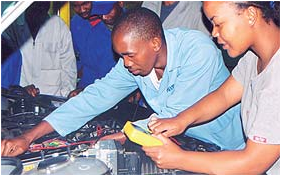 Passing matric is like crossing the bridge to a brighter future.
Passing matric is like crossing the bridge to a brighter future.
It is after passing matric that learners can go to universities or colleges to study for a career. Getting good matric results opens doors to scholarships.
But, if you don’t have a matric certificate, don’t give up hope of having a career. There are other opportunities for further study.
New Programme
In the past, there were work-related N-programmes for learners who did not have matric.
The N-programmes ranged from N1 to N6 and were offered by the Further Education Training (FET) colleges. But these programmes have now become outdated.
To replace the N-programmes, the Department of Education introduced a new programme - the National Certificate (Vocational). ‘Vocational’ means it focuses on giving students specific job skills.
To qualify for the new vo-cational programme, you need to pass Grade 9. Unlike the N-programmes, which were half-year courses, the National Certificates are one-year courses.
General education
The new programmes will give a general education on subjects like communication, mathematics and information technology. This will be combined with specific vocational subjects that train students in jobs where they use their hands, like mechanics or technicians.
National certificates
The new programme will be introduced over three years starting this year. N1, N2 and N3 will become Level 2, Level 3 and Level 4. All these certificates are offered under the National Qualifications Framework*.
Further study
Students who have completed Level 4, can look for a job in the field they have been trained in. However, they also qualify to continue their studies for a diploma or degree at a college or university.
- Ndivhuwo Khangale
*What is the National Qualifications Framework (NQF)?
It is a scheme that registers all standards and qualifications in education and training throughout South Africa. It aims to bring together separate education and training systems into a single, national system in line with high standards.
For more information, contact the Department of Education:
080 020 2933 or call 1020
FUN PAGE
FUN PAGE sadminFIND THE HIDDEN WORDS
Print this page to complete this game...
The words listed below are often used in Vuk’uzenzele. See how many you can find, then circle them like the words 'JOBS' and 'WE'. Remember, the words can go down, across, or diagonally from top to bottom or from bottom to top. You can also see how many of the words you can find in Vuk’uzenzele.
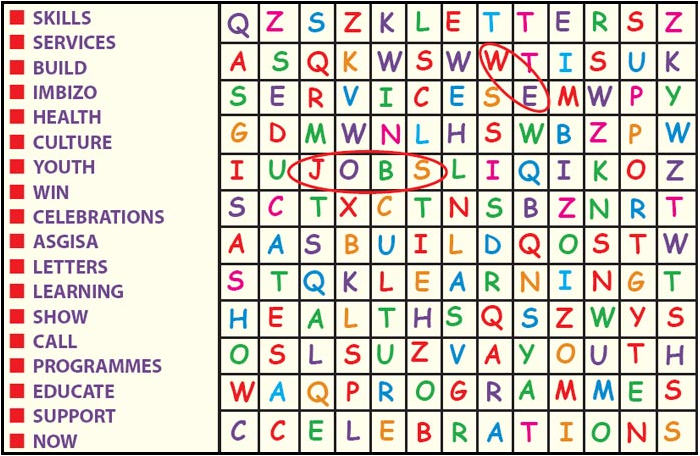
CHOOSE THE WORD THAT DOESN'T MATCH
Limpopo | Gauteng | Western Cape | North West | KwaZulu-Natal | Kalahari
Mpumalanga | Free State | Northern Cape | Eastern Cape
CLICK HERE FOR THE ANSWER
WHICH ANIMAL IS NOT ONE OF THE "BIG FIVE"
Elephant | Rhino | Lion | Kudu | Leopard | Buffalo
CLICK HERE FOR THE ANSWER
MATCH THE FOOTPRINTS
Animals and their footprints (also known as ‘tracks’ or ‘spoor’) is the theme of a set of stamps issued by the South African Post Office. See if you can match the tracks below with the animals. Write the number of the track next to the matching animal’s name below the picture.
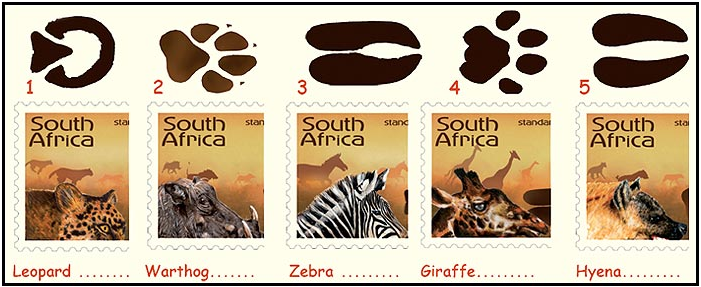
Stamps and images used with the permission of the South African Post Office
GUARD AGAINST DEADLY TB STRAIN
GUARD AGAINST DEADLY TB STRAIN sadmin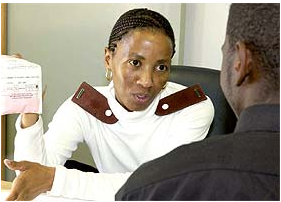 GUARD AGAINST DEADLY TB STRAIN
GUARD AGAINST DEADLY TB STRAIN
In the past few months, a lot has been written in the media about the deadly type of tuberculosis (TB) called Extreme Drug Resistant Tuberculosis (XDR-TB).
XDR-TB is more dangerous than ordinary TB because it is stronger than at least six types of drugs or medicines that treat ordinary TB.
This form of TB was detected in the 1990s. Cases of XDR-TB have recently been reported in KwaZulu-Natal and there have been a small number of cases in Gauteng and the Free State.
No new TB drugs have been developed in the past 30 years. This makes XDR-TB even more difficult to treat.
How XDR-TB is spread
Like ordinary TB, XDR-TB is spread through the air when a person with TB sneezes or coughs and another person breathes in the germs.
People get this TB easier if their bodies are weak due to poor nutrition, smoking, alcoholism, ageing, stress or diseases like uncontrolled diabetes, cancer, and HIV and Aids.
Who is at risk
The majority of healthy people are not at risk of getting this Khangaledisease, unless they come into contact with a person who has XDR-TB and who has:
- not received proper treatment; or
- has been on the treatment for less than a week.
What to do if you have been in contact with infected people
If you live or work with a person with XDR-TB or have any of the signs of the disease, you must go to a clinic or hospital as soon as possible to be tested.
If the test is positive, you can get free treatment from your clinic. Start taking your medicine immediately and keep taking it for six months.
Ask someone like a health or community care worker, friend or family member to help you keep to the treatment plan.
Live healthy by eating healthy food, getting exercise, avoiding alcohol, and not smoking.
Can XDR-TB be cured?
Yes, in some cases, but it depends on the strength of the disease, proper treatment, and the patient’s general health.
What should a diabetic person eat?
Eating healthy food is a very important part of controlling diabetes. Your clinic or doctor will give you advice on how to eat correctly and draw up a special eating plan for you.
- Ndivhuwo Khangale
TYPES OF DIABETES
- Type 1: Also known as insulin-dependent diabetes. Children usually get it and it is usually diagnosed before the age of 40.
- Type 2: Also known as noninsulin dependent diabetes. Adults usually get it and it is mostly associated with overweight.
- Gestational diabetes: This type starts during pregnancy and usually disappears after the child is born.
HEALTH AND WELLNESS HIV AND AIDS: SHOW SOME RESPECT
HEALTH AND WELLNESS HIV AND AIDS: SHOW SOME RESPECT sadmin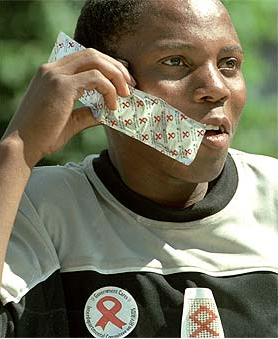 Government has come up with a major programme to reduce new cases of HIV and Aids infections, especially among young people.
Government has come up with a major programme to reduce new cases of HIV and Aids infections, especially among young people.
Deputy President Phumzile Mlambo-Ngcuka released the broad principles of the National Strategic Plan on HIV and Aids for 2007-2011 on 1 December - World Aids Day - in Nelspruit, Mpumalanga. The plan will be finalised early this year in consultation with civil society.
Reduce infection
The new plan follows the country’s first five-year plan for 2000-2005. The new plan has been developed so far by the Department of Health.
It aims to reduce the number of new infections, especially among young people between 15 and 24 years old. It also aims to reduce the rate of new HIV infections by half by 2011 and to ensure that the majority of people who are HIV-negative remain negative.
Practice safe sex
Different ways will be used to get the message across to as many people as possible. These include newspapers, magazines, pamphlets, billboards, radio and television.
People will be encouraged to practice safe sex and young people between 14 and 17 years will be encouraged not to have sex until they are older, more responsible and in stable relationships with one partner.
The plan will also focus on reducing the infection rate on sex workers, men who have sex with men, men working away from home, drug users and others.
Educating the public
The plan will make sure that people living with HIV and Aids are involved in the programmes aimed at educating the public about the disease at all government levels.
Through this plan, government will also address the lack of human respect that is sometimes shown to people living with HIV and Aids.show some respect!
People will be educated more about the disease to help them understand and respect those with HIV and Aids. They will also be taught how to treat people living with HIV and Aids.
Treatment includes antiretroviral medication for those who need it. It does not cure HIV, but can slow down the effects of the disease. It helps to protect the body against other diseases and helps people to live longer more productive lives.
Still no cure
Mlambo-Ngcuka reminded people that there is still no cure for HIV and Aids. She said that it was good to know that people can keep infection with the HIV virus from becoming full-blown Aids through responsible lifestyles, good nutrition, exercise and proper treatment.
- Ndivhuwo Khangale
- More than 1,7 million people have used the voluntary counselling and testing services available at 4 172 clinics last year.
- More than 380 million condoms are being dis-tributed a year.
- Services to reduce the risk of mother-to-child transmission of HIV are available in all public hospitals and 86 per cent of clinics countrywide.
- More than 480 000 have benefited from the Department of Health’s nutritional support programme in the area of treatment, care and support.
- TB is curable even when one is infected with HIV and Aids.
- Free TB test and treatment is available at hospitals and clinics.
- ARVs are now available at 273 hospitals and clinics across the country.
- More than 213 282 people have been getting anti- retroviral treatment in the public sector alone.
Some important dates in the Health Awareness Calendar for 2007
January
Sun Smart Awareness Month
31 World Leprosy Day
February
Reproductive Health Month
4 World Cancer Day
12 –18 Pregnancy Awareness Week
March
Health and Nutrition Campaign
21 Human Rights Day
24 World TB Day
April
Health Awareness Month and National Donor Month
7 World Health Day
25 Africa Malaria Day
May
Anti Tobacco Campaign Month
31 No Tobacco Day
June
National Youth Month
1 Children’s Day
16 Youth Day
19 – 26 Drug Awareness Week
July
Mental illness and Men’s Health Month
11 World Population Day
August
National Women’s Month
9 National Women’s Day
31 - 5 September, Cancer Prevention Week
September
National Heart Awareness Month
October
Women’s Health – Breast Cancer Awareness Month
November
Red Ribbon Month
5 National Children’s Day
25 – 10 December – Activism on No Violence Against Women and Children
December
1 World Aids Day
3 Day of Disabled
HELP AT HAND ROAD ACCIDENTS - HOW TO MAKE A CLAIM
HELP AT HAND ROAD ACCIDENTS - HOW TO MAKE A CLAIM sadmin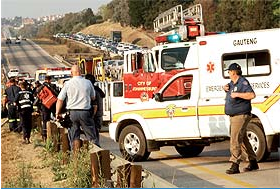 Have you been injured in a road accident and had no idea how you were going to pay the medical costs?
Have you been injured in a road accident and had no idea how you were going to pay the medical costs?
You don’t have to feel helpless again, because you can claim money on your own from the Road Accident Fund (RAF). You can go to any office of the RAF. The RAF staff will help you to claim money and you will not have to pay a cent.
What is the RAF?
The RAF is a public body set up by law to help people who are injured in road accidents. The RAF will also pay the children of anyone who was killed in a road accident.
Because the RAF offers a free service, nobody is forced to employ a lawyer to prepare a claim. Lawyers charge a fee for their professional services.
Do not sign any legal papers at the place of the accident or in hospital. By signing these papers you will be giving lawyers the right to claim on your behalf.
If you want lawyers to claim money from the RAF for you, they must tell you how much they will charge you before you sign the papers.
Who can Claim?
- An injured person, except the driver who caused the accident;
- a child of any person who was killed;
- a close relative of any person who was killed, to pay for funeral costs.
A parent or guardian must assist a child younger than 21. A curator must assist a person whose brain is damaged.
What you can claim for:
- the costs of medicine needed because of the accident;
- the costs of paying for a funeral;
- loss of income if you are disabled because of the accident;
- pain and injuries suffered as a result of the accident.
How you can claim
To claim, you must hand in:
- the prescribed claim form;
- a certified copy of your ID;
- a sworn statement that explains how the accident happened;
- a pay-slip to prove loss of in-come;
- a document to prove the costs of medicines;
- copies of hospital records
- a police report.
- Justice Mohale
What to do after an accident
- Place red triangle warning signs on the road.
- Call the emergency services like the police and ambulance.
- If people have been injured do not remove the car before the emergency services arrive.
- Write down the names, ID numbers, addresses and telephone numbers of the drivers involved.
- Write down the registration numbers and vehicle license number.
- Report the accident as soon as possible to the nearest police station and get a reference number.
INTERNATIONAL RELATIONS CHINA/SA - 'A JOURNEY OF HOPE'
INTERNATIONAL RELATIONS CHINA/SA - 'A JOURNEY OF HOPE' sadmin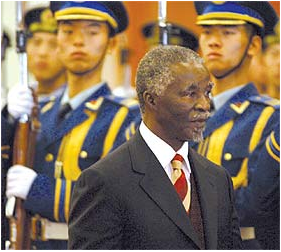 China has been a good friend of Africa for many years. The country played a very important role during South Africa’s struggle against the apartheid government.
China has been a good friend of Africa for many years. The country played a very important role during South Africa’s struggle against the apartheid government.
Good relations between China and South Africa were strengthened in recent months. In January 2006, China adopted its ‘African Policy’. In June 2006, the two countries signed the first formal friendship agreement at the China-South Africa Business Co-operation Forum in Cape Town.
Peace and stability
At the forum Deputy President Phumzile Mlambo-Ngcuka thanked China for supporting the liberation movement and helping to promote peace and stability in Africa. She said China had been a true partner of Africa.
"South Africa will continue to strengthen ties with China. The development of China’s economy will benefit South Africa and the whole of Africa," Mlambo-Ngcuka said. She called on business owners to support the relationship between the two countries because it would create jobs and business opportunities.
Textiles and clothing
Concerns about China’s textile and clothing exports to South Africa, have led to talks between the two countries.
China will sign an agreement with South Africa to limit its exports of clothes and textiles to this country. In line with the agreement, China will help to train South African technicians in the clothing and textile industry. China will also encourage its clothing companies to make direct investments in South Africa.
First step
The friendship between the two countries was further strengthened when President Thabo Mbeki visited China last year.
Mbeki attended the Forum on China-Africa Co-operation in Beijing with some senior cabinet ministers.
Of the China-Africa partnership Mbeki said “... in November 2006, Africa and China joined together to take the first step in a journey of hope that is as long as a thousand miles.”
- Justice Mohale
KEEPING IT BRIEF
KEEPING IT BRIEF sadminVICTIMS CAN STILL CLAIM TRC MONEY
More than 600 people who qualify for reparation (money paid for loss or suffering) from the Truth and Reconciliation Commission (TRC) have not yet come forward to claim the money.
People who have been confirmed by the TRC as victims can claim R30 000 reparation. They can do so by going to the Department of Justice and Constitutional Development with their TRC reference numbers and ID books.
Some of the people who have not claimed, may have moved to new addresses or died or may not know that they can claim. Community-based organisations, family and friends are asked to help in the search for anyone who qualifies, but who has not claimed yet. The department is talking to the families of the victims who have passed away to find out who the beneficiaries are so that the remaining money can be paid to them.
- staff reporter
For more information contact the Department of Justice and Constitutional Development at: (012) 315 1286, (012) 315 1292 or (012) 315 1425
* Reparation - money paid to people or groups for loss , insult, injury or suffering.
North West
The province’s 2006 matric pass rate was 4 per cent higher than the previous year. It increased from 63 per cent in 2005 to 67 per cent in 2006. This is thanks to a plan introduced by the provincial department of education to im-prove matriculants’ performance. The number of learners who qualify to study at a university, increased to 967.
The provincial government is offering 20 bursaries to learners who have achieved top marks in the 2006 examinations.
- BuaNews
Western Cape
The redevelopment of Cape Town’s Greenpoint stadium and the Urban Park Multi-purpose Centre at the Green Point Common was approved in January. It will be a world-class venue which will host the semi-final of the 2010 FIFA World Cup. The centre will play an important role in the economic growth and development of Cape Town and the Western Cape.
- BuaNews
Eastern Cape
Two doctors from Tunisia offered their services free of charge at a Butterworth hospital in January as part of a co-operation agreement between South Africa and Tunisia. The doctors are eye specialists and came to South Africa for two weeks as volunteers. They did several eye operations for needy patients.
The agreement between the two countries was signed seven years ago. Meetings were held to discuss ongoing projects.
- BuaNews
Gauteng
Police in Gauteng bought 250 new vehicles to strengthen the province’s crime-fighting plan. The vehicles will be used mainly in Johannesburg, Pretoria and Ekurhuleni by the flying squad, crime fighting and dog units.
The province is also appointing more than 3 000 additional police officers. They include station commis-sioners, detectives, crime prevention officers, crime intelligence officers and support personnel.
- BuaNews
Northern Cape
The province’s top 100 matriculants will receive bursaries from the provincial government to continue their studies in fields where scarce skills are needed.
The Industrial Development Corporation, as well as the book publishers Maskew Miller are also offering bursaries to top performers in the matric exams.
- BuaNews
KwaZulu Natal
Last year, about 7 000 more girls wrote matric exams in KwaZulu-Natal than boys. Girls also per-formed better than boys in the exams said provincial Education MEC, Ina Cronje. In some subjects like Biology Higher Grade, girls are out-performing boys for the first time, she said.
About 21 000 of the learners who passed in the province qualify to study at universities.
- BuaNews
For more information about the news items featured on this page, call 1020
LETTERS TO THE EDITOR GIVE US A PIECE OF YOUR MIND
LETTERS TO THE EDITOR GIVE US A PIECE OF YOUR MIND sadmin WINNING LETTER
WINNING LETTER
Don't be foolish about life
Parents still regard sex as a taboo subject and so the circle of ignorance and hurt grows.
Our parents remember when we got our first tooth and our first day of school. But they shy away from our first sexual encounters. Because of this too many young people become lost. They don’t know what to expect or how to say ‘no’.
This cannot go on in this day and age when sex can mean a death sentence.
Parents, please talk to your children about sex. Don’t fool yourselves.
Pretending these things don’t happen, won’t make them go away. Children, listen to your parents. Don’t be foolish about life, love and your future.
- Rachel, Sebokeng, Gauteng
Albinism - a condition, not a curse
I am a person with albinism and the pain of being different because of my skin colour is horrible. You have to listen to what other people say about you, which hurts a lot. People with albinism are often isolated or discriminated against because other people do not understand the condition Although I have experienced a lot of pain in my life I have never given up on working harder. My motto for this year is ‘if you have a dream, dream big’ and my slogan for people with albinism is ‘nothing about us without us.’ I am a person with albinism and I’m proud to be one.
- Khetiwe Mbuyazi, Richards bay, KwaZulu-Natal
They're like everyone else
I am a girl of 17 years old and would like to say that people with albinism are normal human beings with a skin problem. They are like each and everyone of us and we should treat them like everyone else. We should not judge them or discriminate against them; they did not choose to have albinism. We should include them in our activities to show them we love them. I think people with albinism are fun to have around. Most of them have a great sense of humour. We should give them a chance to live their lives to the full and not ridicule them.
- Rebecca Tsokolibane, Ikageng, North West
Taxis must follow the rules
I think it is time for taxi drivers to do something about the way they drive. They are responsible for many horrific road accidents. Is life worth so little that people can drive recklessly and get away with it? Some taxi drivers are not even fit to ride a bicycle. I appeal to the entire taxi industry: please follow the road rules. The roads belong to all of us, not just the taxis. Transport Minister, Jeff Radebe, should do something about this problem. Taxi drivers need to be trained to become professional and responsible service providers.
- Papikie, Mogoto Village, Limpopo
Reply from the Department of Transport:
Government is developing a public transport system that is reliable, safe and comfortable. We must do this because 74% of South Africans cannot afford to buy cars and 65% use taxis to get to work. The Department of Transport is working hard to make sure taxi drivers receive advanced driving skills. The Taxi Recapitalisation project is part of government’s road safety strategy. We welcome the Number 1 Taxi Driver Competition. We believe it will contribute greatly towards reducing road accidents. The Transport Training and Edu-cation Authority (TETA) also has many programmes to help taxi drivers. The programme includes training in professional driving, customer care, administration and general business skills.
Leader's of tomorrow
South African schools are heading for a crisis; a crisis of killing in some schools. I have had enough of the alarming and increasing number of learners killed in our school environment. Our guardians and parents send us to schools as learners hoping that our lives can be improved, hoping that the school is the safest place in our community and hoping that we can change our lives for the better. But how can our lives be improved if we are killing one another? As a learner I am very disappointed. Let us not see one another as enemies, but as friends; let us be leaders of tomorrow, not murderers.
- Tsolo Tauhadi, Matwabeng , Free State
The key to your future
As a teen I am very worried about teenagers who always give up on the good things. Why don’t they rather give up on the bad things. Most teenagers in peer groups or gangs leave school because they tell each other school is a waste of time. But they are totally wrong. They should think again. Stop giving up on school! Education is the key to the future.
- Daluxolo Cofa, Goshen Village, Eastern Cape
Alcohol leads to unsafe sex
I would like to warn adults and young ones not to drink alcohol and think of having sex. When you drink alcohol you do not think about using a condom. This results in unsafe sex and HIV. It happened to me. If I was not drunk, I know I would have used a condom. Please try to stay alert and alive longer. Whether you are HIV negative or positive, keep on using a condom for your own future.
- Cwijimpi Jele, Umkomaas, KwaZulu-Natal
We must combat crime
Criminals don’t belong in our communities; they belong in jails. But the jails should not be too soft on them. They deserve the hard way, because they have robbed, killed, raped and molested innocent people. South Africa is a beautiful country to live in, but if we don’t do something to combat crime, it will become a miserable place to live in.
- Tepo Kopa, Marquard, Free State

Write to: Vuk’uzenzele, Private Bag X745, Pretoria, 0001,
or e-mail: vukuzenzele@gcis.gov.za.
If you don’t want to have your real name published, you may use a different name,
but please include your real name and address to us.
MONEY MATTERS BECOME MONEY WISE - START SAVING TODAY
MONEY MATTERS BECOME MONEY WISE - START SAVING TODAY sadmin Do you want your money to grow and last longer? Then decide today to start saving NOW!
Do you want your money to grow and last longer? Then decide today to start saving NOW!
The year is still new. Maybe you made New Year’s resolutions, like many people do. Some make resolutions at the beginning of the year to lose weight or stop smoking, others to start studying or get a new job.
Usually we can’t keep all the promises we make to ourselves, but we can become money wise. We can promise ourselves to be more careful with our money and to start saving - not only for the year ahead, but for our future and the future of our children, advises the SA Savings Institute.
Do a budget
The first step to saving is to do a budget. Your budget is a record of all the money you earn in a month mattersand all the money you spend in that month. It will show you where you can spend a bit less or cut out things that you don’t really need so that you can save the money.
If you save something every month, you will see your savings grow. Soon you will be able to achieve your goals. Without goals you will never make your dreams come true.
Set goals
You can start by setting some goals for this year like paying off a loan or saving for your children’s education or a holiday.
You should also set goals for the future like saving for your old age. One of the most important reasons to save is for your children’s education. This year you will pay more than R2 000 if your child goes to a government high school. You will need money for school fees, uniforms, books and school trips.
Borrowing is expensive
If you do not save this money, you will have to borrow. But borrowing is expensive, because banks and money lenders charge interest. It means you have to pay back much more than you borrowed.
By the year 2020, studies at a college or university may cost as much as R70 000 per year. If you start saving at the birth of your child and carry on saving R300 a month for 18 years, you could end up with almost R106 000! Your savings will have earned interest of more than R41 000.
So make a New Year’s promise to yourself to become money wise and start saving.
- Ndivhuwo Khangale
Tips for saving
- Save some of your pay every month, even if it’s only a few rands.
- Start now! Don’t make excuses like "I’m too young to save," or "I’ll save next month."
- Find out from your bank about special savings plans.
- Buy only what you need and what you can afford.
- Save water and electricity. You will save money and help the environment at the same time.
- Be careful about credit. It is cheaper to save money and buy something cash than to buy on credit, because you pay interest on credit.
NEW REGULATIONS SAFER PARAFFIN PRODUCTS WILL SAVE LIVES
NEW REGULATIONS SAFER PARAFFIN PRODUCTS WILL SAVE LIVES sadmin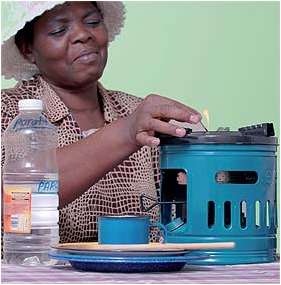 About 20 million South Africans use paraffin for cooking, heating or lighting. Many paraffin stoves are dangerous because of poor quality. Thousands of people in squatter camps have lost their homes and belongings in fires caused by paraffin stoves; some have even lost their lives.
About 20 million South Africans use paraffin for cooking, heating or lighting. Many paraffin stoves are dangerous because of poor quality. Thousands of people in squatter camps have lost their homes and belongings in fires caused by paraffin stoves; some have even lost their lives.
Danger must end
The paraffin products used by poor people are cheap and built at a low cost. They are dangerous because they are put together badly and made of weak metal. This means they can have loose parts or rust easily. Many people don’t know that they are dangerous or how to use them correctly.
Government now has a plan to end the use of dangerous paraffin products. Last month, Minister of Trade and Industry, Mandisi Mphahlwa, said from January 2007 all paraffin stoves and heaters made and sold in South Africa should be in line with standards set out by the South African Bureau of Standards. Government’s plan means it is against the law to sell paraffin stoves and heaters that do not meet these standards.
Senior project manager of the Paraffin Safety Association of South Africa, Teri Kruger, said government’s move was good news for everyone.
Affordable prices
"Paraffin remains a cheap and practical source of energy for most poor South Africans," she said. "Thanks to government’s plan, it will be illegal to sell bad quality products."
This means paraffin will continue to improve the lives of people who cannot afford electricity, but its use will be controlled.
The Paraffin Safety Association said it would support government by encouraging companies that make paraffin stoves and heaters to provide quality products at affordable prices.
The Association, together with the Bureau of Standards, will watch companies that manufacture these products to ensure that they make good quality products.
In the past few years the Bureau of Standards has started talking to companies making paraffin stoves to get them to follow the rules.
Saves lives
The Paraffin Safety Association advises people who use paraffin stoves, heaters and lights to ask shop owners for certificates as proof that the Bureau of Standards approved the product. Safer products can save people’s lives.
- Justice Mohale
Possible penalties for selling paraffin products that are not in line with safety standards:
- the products will be taken away from sellers;
- sellers will get a fine;
- products imported from overseas will be taken away or returned to their countries.
For more information, call 1020
NEW SCHOOL CURRICULUM LEARNING FOR LIFE
NEW SCHOOL CURRICULUM LEARNING FOR LIFE sadmin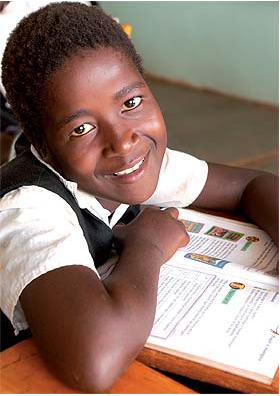 South Africa needs more skilled people to help grow the country’s economy and fight poverty.
South Africa needs more skilled people to help grow the country’s economy and fight poverty.
We have far fewer workers with special skills than we need. We need more skilled electricians, carpenters, builders, technicians and people with knowledge of information technology.
Specialised Jobs
Minister of Education, Naledi Pandor, said that over the next three years, there will not be enough qualified South Africans for many thousands of specialised jobs.
In information tech-nology, 113 000 jobs will be available.
Another 60 000 jobs will be available in technology fields like telephones and the Internet.
To solve this problem the Department of Edu-cation has introduced a new curriculum in schools. Learners now learn subjects and skills that will prepare them to study at universities and colleges and to qualify for the careers they want.
Senior Certificate
Grade 10 learners started with the new curriculum in 2006. Grade 11 learners start this year and Grade 12 learners will start next year. All learners in the new curriculum must do seven subjects in Grade 10, 11 and 12 to qualify for a National Senior Certificate.
Subjects now have new names. For example, Biology has become Life Sciences and Home Economics is called Consumer Studies. Typing and Computing has been changed to Information Technology. The new names show that the subjects include new knowledge and skills.
South Africa is not the only country to introduce a new curriculum. Many developed and developing countries have also changed their national curricula. The purpose is to teach learners the modern knowledge and skills needed in today's world.
Important Subjects
Pandor says that each learner must now do two of South Africa's official languages. One must be the learner's home language.
All learners must also do Mathematical Literacy and Life Orientation. So four subjects are compulsory. Learners have no choice about doing them, but they can choose their other three subjects from a wide range of options.
"Knowledge of technology, mathematics, science and life skills is very important in today’s world," Pandor said.
By preparing young people with these skills and knowledge from an early age, we are helping them to succeed in life and work, she said.
Your own business
If you have always dreamed of starting your own business, you don't have to join the long line of job seekers. You can realise your dream of becoming an entrepreneur through government’s Small 7Enterprise Development Agency (Seda).
Seda will help you with information like how to start and run your own business and how to get the right business training. They work with organisations that support small businesses throughout the country.
Seda has Enterprise Information Centres and branches in the main centres of all the provinces.
Learnerships
Have you ever wanted to study at a university or college, but don’t have money? Government wants all young people to have opportunities for further study and has a plan to help you with money.
For the past five years, Sector Education and Training Authori-ties (SETAs) have provided training and money to develop skills through learnerships.
Learnerships are part of government’s plan to develop skills. A learnership means that you work for a company, while getting specialised on-the-job training and study at the same time. The relevant SETA will pay the costs of the training. Competition for learnerships is tough and applicants must do a selection test before being accepted.
- Ndivhuwo Khangale
The new syllabus will teach learners modern knowledge and skills needed in today's world
For more information about the curriculum, contact the toll-free number: 080 020 2933.
ROLE MODEL CRIME DIDN'T PAY, BUT HARD WORK DID
ROLE MODEL CRIME DIDN'T PAY, BUT HARD WORK DID sadmin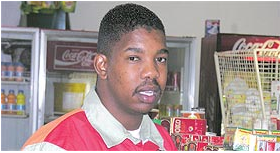 It’s only 10am but the sun is so hot it feels like midday. Women on the streets of Mohlakeng township in Randfontein shield themselves with colourful umbrellas.
It’s only 10am but the sun is so hot it feels like midday. Women on the streets of Mohlakeng township in Randfontein shield themselves with colourful umbrellas.
Vuk’uzenele is visiting this township west of Johannesburg to interview one of its youngest and most successful businessmen.
Vusi Ndlovu is very popular here. People wave as he drives through the streets in his 4x4 bakkie.
Young and successful
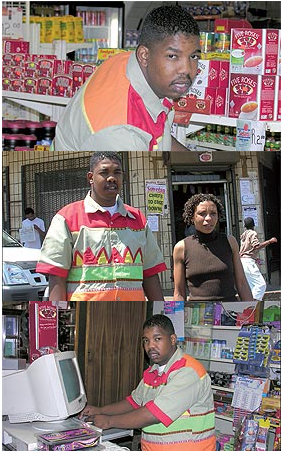 The community love and respect Ndlovu - not only because he is young and successful, but also because he has achieved more than most others his age, despite difficult circumstances.
The community love and respect Ndlovu - not only because he is young and successful, but also because he has achieved more than most others his age, despite difficult circumstances.
Ndlovu is only 27 years old and owns a big supermarket and butchery. He also rents out part of the building housing these shops.
A good headline for Ndlovu’s life story would be: "From rich to poor and back again."
His father died
Asked if his success was due to being single and living with his mother, Nlovu laughs. "No, not at all!" He explains that in 1990 his father, a well-known businessman in Mohlakeng, became ill. Close family members took over his father’s businesses.
When his father died in 1996, these family members kept Ndlovu and his mother out of his late father’s businesses.
Then his mother got sick and Ndlovu had to support her. He started doing crime to make money. "We did things like hijacking cars and stealing. In 1998, I was arrested for car theft and was sentenced to six years in prison."
Ndlovu decided to change his life. "I studied in prison and passed my matric. I did courses in business management, woodwork and curtain making," he says.
After nearly four years, Ndlovu was released in 2002. But during this time the bank had taken back some of his father’s businesses. Others had closed.
He went to his family and told them he wanted his father’s businesses back. "My father had left me about R10 000 for schooling. I used it to start a business selling sweets and chips at schools."
Kick-start programme
He enrolled at the SAB Kick-start programme which helps people start businesses. Since then Ndlovu has won several awards. In 2004, he got R100 000 for the most improved business and won an award from the Nations Trust. Ndlovu’s hard worked has paid off and his business now makes a profit of R1,5 million a year. He employs 12 workers and has reclaimed some of his father’s businesses from the bank.
- Ndivhuwo Khangale
UNDERSTANDING THE LAW CONTRACTS - ARE WRITTEN OR SPOKEN
UNDERSTANDING THE LAW CONTRACTS - ARE WRITTEN OR SPOKEN sadmin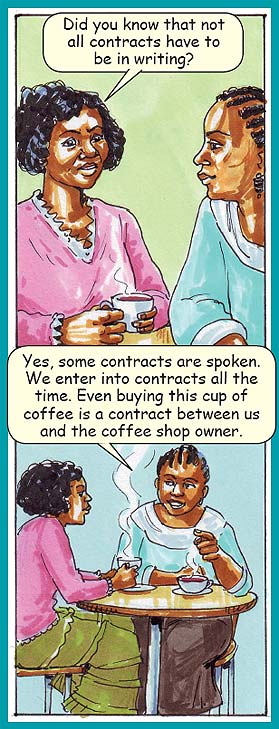 Contracts will always be part of our lives.
Contracts will always be part of our lives.
A contract is a binding agreement between two or more parties for doing or not doing certain things. Most contracts can be enforced by law.
Whether you buy a loaf of bread or a house, you enter into a contract. If you do not get the bread after paying R5 for it, the shopkeeper would have broken a contract with you.
Marriage contract
Many people think that a legal contract, must be in writing. But this is wrong. Not all contracts have to be written.
Travelling to work in a taxi or eating at a restaurant are forms of contracts that are not in writing.
But employment, buying a house or a car and credit agreements for buying things like clothes or furniture have to be in writing. Renting something from someone, insurance contracts, contracts for services and marriage contracts must also be written.
Contract of sale
A contract of sale is a document between a buyer and seller setting out terms and conditions.
The law says the seller is responsible for a hidden fault in a product. But if you buy something "voetstoots" or "as it stands", you agree to buy the product as it is. This means it is sold at the buyer’s risk and the seller is not responsible for any faults.
Credit agreement
A credit agreement is a contract where goods or services are given in return for money paid over a specific time.
Sometimes you can take the goods home, like when you buy furniture. But the goods remain the property of the seller until the buyer has paid all the money.
Such agreements used to be known as "hire purchase agreements", but they are now called "instalment sales agreements".
'Cooling off' period
The law says with a credit agreement the buyer has a ‘cooling off’ period of five days. This means the buyer has five days from the day the credit agreement was signed to have a change of mind.
During this time goods can still be returned and the agreement cancelled. However, the contract must be signed at the buyer’s home or away from the seller’s business for the ‘cooling off’ right to work.
If you have to cancel a contract, do it in writing and get a con-firmation letter.
Proof of terms
When there is a written contract the parties who enter into the contract know what their responsibilities are. If there is a problem, a written contract would give proof of the terms and conditions.
When entering into a contract, always make sure what the terms and conditions are. Don’t just sign a contract without knowing what you are signing for.
- Ndivhuwo Khangale
For more information on contracts, call 086 166 2837
YOUTH WANTED FOR 'PROUD TO SERVE' PROJECT
YOUTH WANTED FOR 'PROUD TO SERVE' PROJECT sadmin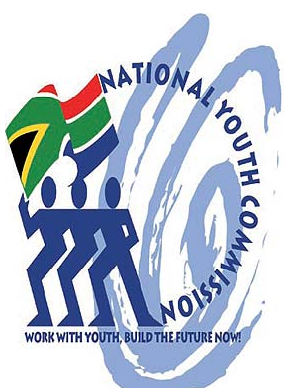 The National Youth Commission is looking for 9 000 young people to be part part of the ‘Proud to Serve’ National Youth Service Volunteer Campaign.
The National Youth Commission is looking for 9 000 young people to be part part of the ‘Proud to Serve’ National Youth Service Volunteer Campaign.
The National Youth Service is a presidential project of government to involve our youth in the reconstruction and development of our country. It wants to ensure that young people take part in the development of communities and develop their own skills while doing so.
In President Thabo Mbeki’s 2006 State of the Nation Address, he said that 10 000 youth volunteers should take part in the National Youth Service programme. The programme aims to get 1 000 young people from each of the nine provinces to register.
The National Youth Commission leads the campaign. Other partners are the National Youth Service Unit, the Umsobomvu Youth Fund and the South African Youth Council.
Deputy President, Phumzile Mlambo-Ngcuka, made a call to all young people to register to volunteer their services for this programme.
Provincial Youth Commissions and municipalities have been given information on the projects in which young people can take part.
- Ndivhuwo Khangale
|
If you are young and want to be part of the ‘Proud to Serve’ project, you can get your registration form by calling the Youthline on |
|
For more inforamtion on other activities of the National Youth Commission, or to get your FREE Youth Information Guide, call the |